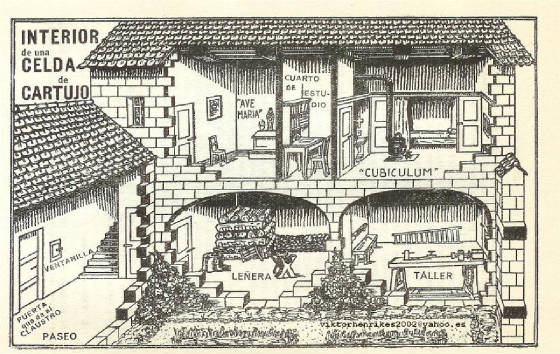|
We share certain monastic values with other contemplative, for example: silence, work, poverty, chastity, obedience, listening
to Scripture, prayer, and humility. Others are proprietary.
The first essential characteristic of our life is the vocation of solitude, to which we are specially called. The Carthusian monk searches for God in solitude.
Our primary application of our vocation is to give ourselves to the silence and solitude of the
cell. It is the holy ground, the area where God and his servant hold frequent conversations, as in between friends.
There, the soul often unites itself to the Word of God, bride to the groom, the earth to the sky, man to the divine. (Statutes
4.1)
Solitude is lived on three levels
- Separation from the world
- The Cell
- Interior solitude, or solitude of the heart
1. Separation from the world is made possible by the cloister. We only leave the monastery for an occasional walk. We do
no receive visits and exerts no outside apostolate. We have neither radio nor television in the monastery. It is the prior
who receive news and tell the monks that which they need to know. Such are united the necessary conditions for internal silence
to develop which then permits the soul to stay alert and attentive to the presence of God.
2. The Cell is a hermitage filled in such a manner as to assure the Carthusian a solitude as complete as possible, all while giving
him the necessities of life. Each cell consists of a two story building surrounded by a garden, where the monk lives alone
for most of the day, for the duration of all his life.

It is due to this solitude that each of our homes is called a Desert or Hermitage.
3. The cloister and cell only assure an external solitude. It is only a first step whose aim is to favor interior solitude,
or purity of heart: to keep one's spirit at bay of any and all things not of God or who do not lead towards God. It is at
this level that the Carthusian meets the whims of his imagination and the fluctuations of his fancy. As long as the monk discusses
with his "self", his sensibilities, his worthless thoughts, unreal desires, he is not centered on God. It is here that he
experiences his weakness and the power of the Spirit which he learn bit by bit "...the habit of the tranquil listening
of the heart which allows God to enter by all path and access." (Statutes 4.2)
Visits?
Liturgical celebration do not have any pastoral intent. This explains why those outside the Order are not admitted to participate
at the officers or the Mass celebrated in the churches of our monasteries. In reason of our call to solitude, visits are limited
to the family members of the monk (2 days a year) and to those who feel called to our life, which we call retreatants.
Carthusian Life
Life in Cell
Guigo's Praise of Life in Solitude
Top of Page
|
